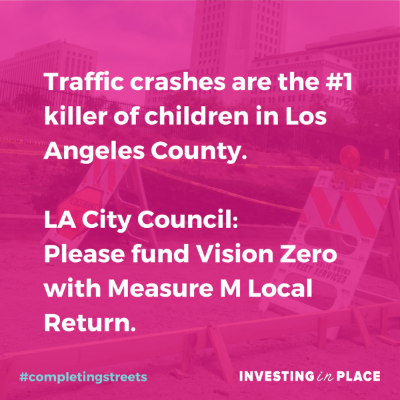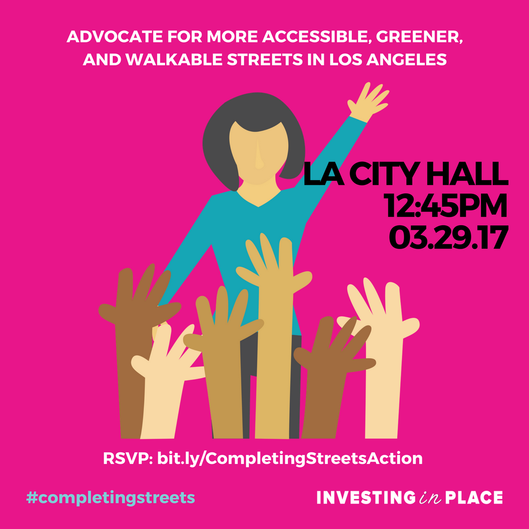Readers who follow Investing in Place, the L.A. County Bicycle Coalition, or Los Angeles Walks are likely aware that these groups are mobilizing for a showdown at tomorrow's Los Angeles City Council Transportation Committee meeting. The Transportation Committee will meet at 1 p.m. at L.A. City Hall, room 1010.
At issue is how the city of Los Angeles will use its new Measure M "local return" funding: adding a new layer of asphalt or building complete streets?
Metro's recently-approved Measure M sales tax dedicates 16 percent to "local return." Cities can use these funds for local transportation projects and programs. Local return funding is very flexible; it can pay staff, build roads, install parking meters, educate bicyclists, host open streets events, etc. For the city of Los Angeles, local return is expected to be more than $5o million per year. The new sales tax revenue starts on July 1, 2017.
On tomorrow's Transportation Committee agenda are two motions on how to divide up L.A. local return:
- Motion 16-0187 (by councilmembers Bob Blumenfield and Paul Koretz) would direct the city to ensure a fair share of local return goes to the San Fernando Valley.
- Motion 16-0395 (by councilmembers Joe Buscaino, Mitch Englander, Herb Wesson and Mike Bonin) would direct the city to dedicate at least two-thirds of local return to rehabilitating worn-out streets.
The fair share for the San Fernando Valley motion is mode-neutral. It does not specify whether Valley funds go to driving, walking, transit, etc. The motion's preamble states that "Many residents in the San Fernando Valley believe that the 2008 county sales tax known as Measure R, did not adequately or fairly address the Valley’s needs" which is essentially a myth. Valley leaders opted for billions of dollars for highway widening (especially the 405 and 5 Freeways) under Measure R, then complained that they did not receive their share of transit funds.
The second motion could be more harmful. To some extent, the proposal is a re-heated version of the failed road bond proposal pushed by councilmembers Englander and Buscaino circa 2012-2014. Early versions of that proposal had $3 billion to repave L.A. roads. Later versions had $4.5 billion, mostly to repave roads, with about $0.6 billion going to sidewalks. The proposals never quite garnered the political momentum to be put to L.A. voters.
Focusing so much funding on road infrastructure is backward-looking and regressive. It ignores the fact that millions of Angelenos get around every day by bus, train, foot and bike. Theoretically, repaving streets is a good time to implement bus and bike facilities designated in the city's Mobility Plan 2035, but in practice, repaving means serving drivers first and foremost.
The motion mentions sidewalks in its preamble, but then jettisons this lip-service when specifying the city would "dedicate at least two-thirds of the City’s share of future Local Return funding toward the reconstruction and rehabilitation of the City’s streets that are in “D” and “F” condition." The D/F grading system applies only to asphalt road bed, not to sidewalks.

Investing in Place put out an action alert urging people to attend tomorrow's meeting and to testify for local return to build “accessible, greener, and walkable streets” and to advance safety, Vision Zero, and active transportation. Included in this is accelerating L.A.’s large-scale sidewalk repair program timeline from 30 years to ten.
Show up to tomorrow's committee meeting and help steer L.A.'s funding priorities. Follow the showdown via the hashtag #completingstreets.






